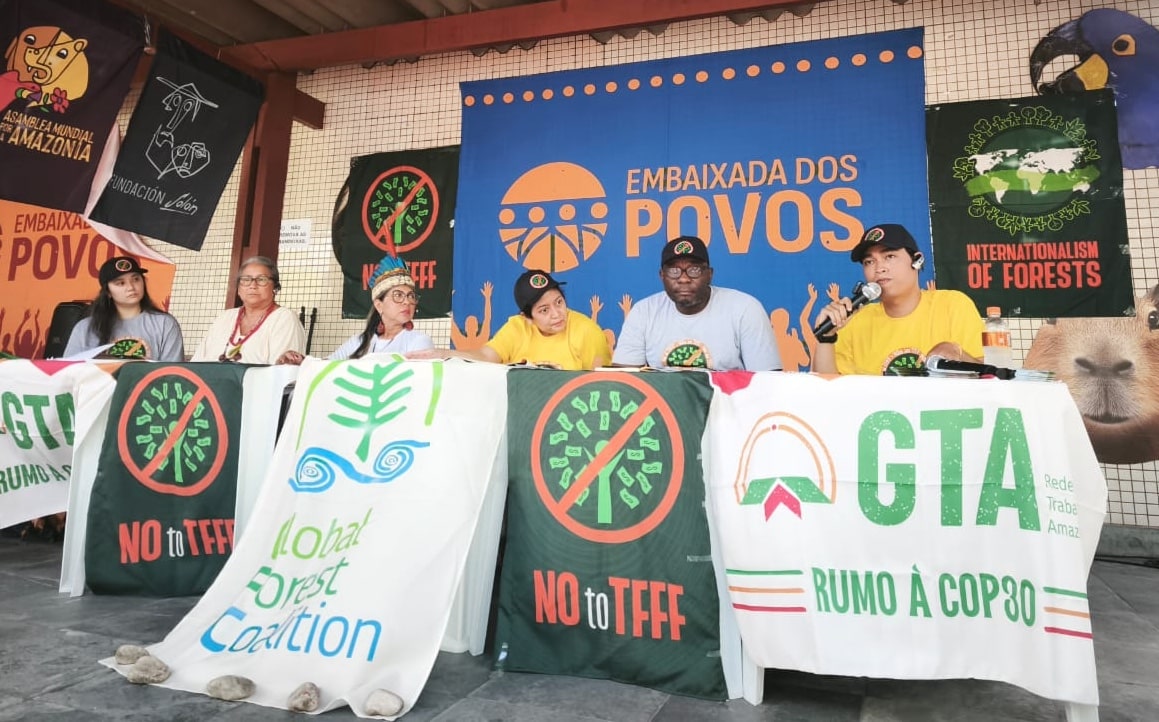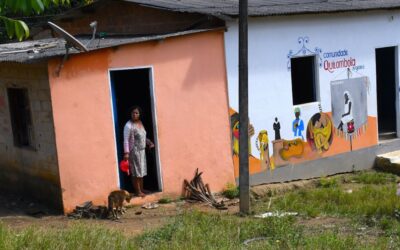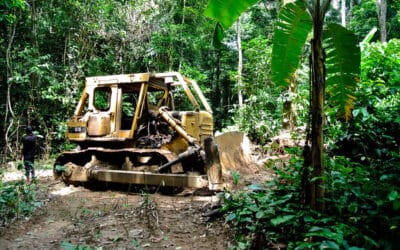No More Green Capitalism, Say Indigenous and Civil Society Groups
November 7, 2025, Belém – A World Bank-managed mechanism to finance forest protection called the Tropical Forest Forever Facility (TFFF) fell far short of the money it promised to raise upon its launch yesterday, ahead of COP 30 in Brazil. Its premise has been rejected by 160 civil society groups and Indigenous Peoples’ organizations, who agree that the fund is colonialistic, prioritizing profits and ignoring the causes of deforestation and forest degradation. The Global Forest Coalition (GFC) has called a press conference at the People’s Embassy for Forests on November 8th at 10 am (Av. Duque de Caxias, 852 – Marco, Belém).
“The TFFF is yet another false solution to the crisis of deforestation and climate change—one that benefits intermediaries instead of the forest peoples who do the work of protecting ecosystems on the ground,” said GFC Policy Director Mary Louise Malig. “Indigenous Peoples organizations know very little about the true characteristics of TFFF and did not give their consent to this mechanism, and it really doesn’t benefit them. Forests are complex living systems that serve as homes and sources of livelihoods for many communities. It is entirely misguided to isolate and financialize their functions. We’ve seen these types of schemes fail over and over again, and sadly, this fund is nothing new.”
Civil society rejected the TFFF in a statement just ahead of its launch in Belem, saying that “The TFFF does not seek to address the true structural causes of forest destruction. It does not propose effective measures to curb and reverse agricultural, mining, and hydrocarbon extraction, nor the expansion of mega-infrastructure projects.”
The signatories, who call for effective action to combat deforestation, include many members of GFC, a network that advocates for rights-based forest protection worldwide, such as WALHI-Friends of the Earth Indonesia, Centre pour la Justice Environnementale in Togo, Fundación Solón in Bolivia, FASE Brasil, and more.
The TFFF intends to raise $125 billion, with an initial $25 billion in pledges from donor countries used to leverage another $105 billion in private investment. However, it has already failed to meet this goal, according to GFC analysts, who oppose the fund on principle and say it is designed to favor the interests of private investors and central governments over those of forest defenders.
“TFFF has fallen at the first hurdle,” said GFC Climate Campaigner Janaina Uemura of Brazil. “An optimistic $5 billion has been pledged—with a number of caveats and conditions—which is way short of what the fund hoped to draw in. If this is extrapolated to the private investment it is likely to generate, the overall fund will be $25 billion, which is $100 billion less than hoped for. This means that instead of the fund raising $4 per hectare as originally targeted, it will be 80 cents. And, if Indigenous Peoples and local communities get 20% of this as planned, that would leave 16 cents per hectare for the people responsible for doing the hard work of protecting forests. A laughable amount.”
A previous report on the TFFF by GFC and member group Fundación Solón delivered strong critiques of the fund’s premise and design. The fund, although heralded by the Brazilian government in Belém, is not actually part of the UN climate negotiations. It was unveiled at the G20 in Rio de Janeiro last year, and is based on a proposal drafted by a former World Bank official in Washington.
Uli Siagian of WALHI / Friends of the Earth Indonesia said: “Putting a price tag on forests is just colonialism in a new suit. The TFFF hands control of our territories to the same banks and governments that drove deforestation in the first place, while forcing the Global South to guarantee profits for the North. Forests are not carbon assets. They are living homelands cared for by Indigenous Peoples and local communities. We need land rights, reparations, and debt cancellation, not another financial scheme that turns our survival into a business model.”
Kwami Kpondzo of Togo’s Centre pour la Justice Environnementale said: “The financialization of nature has proven to be a dangerous distraction to nature conservation and climate solutions. It brings more harm to people and nature, and it keeps community forests dependent on actors outside of their territories. The launch of TFFF and its implementation will be a nightmare for Indigenous People and local communities who have longstanding knowledge of forest conservation. The countries that pledge to invest and sponsor the shameful and destructive mechanism of TFFF must withdraw their engagement if they want to save our tropical forests.”
Pablo Solón of Fundación Solón in Bolivia said: “Instead of innovative action like giving 1% of global military spending to preserve forests, which would generate $27 billion per year from public funds, the TFFF proposal relies on sponsoring countries and private investors through commercial bank mechanisms that have failed and will privatize finance for forests.”
GFC Gender Justice Campaigner Valentina Figuera Martínez said: “The alleged participation of Indigenous peoples and local communities—particularly women, youth, and Afro-descendants—in the TFFF’s decision-making governance system is negligible. States will receive funding and decide unilaterally (subject to the minimum 20% established) rather than Indigenous Peoples and local communities having direct control over the resources, without intermediaries. Nor will they have leadership roles in the design, development, monitoring, and evaluation of the fund’s policies. The TFFF is a farce. No capitalist fund will ever compensate for the spiritual, cultural and socioecological value of tropical forests.”




